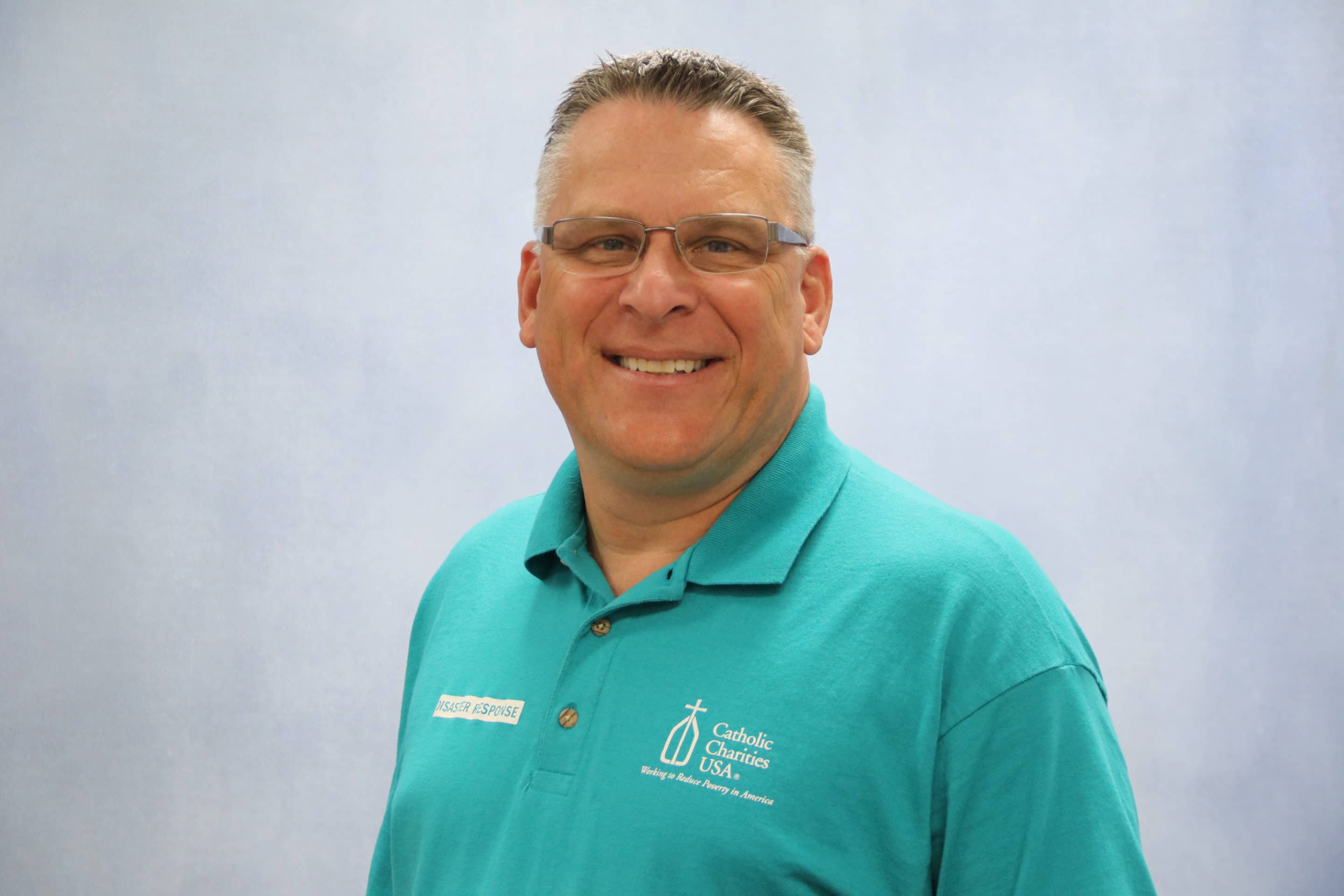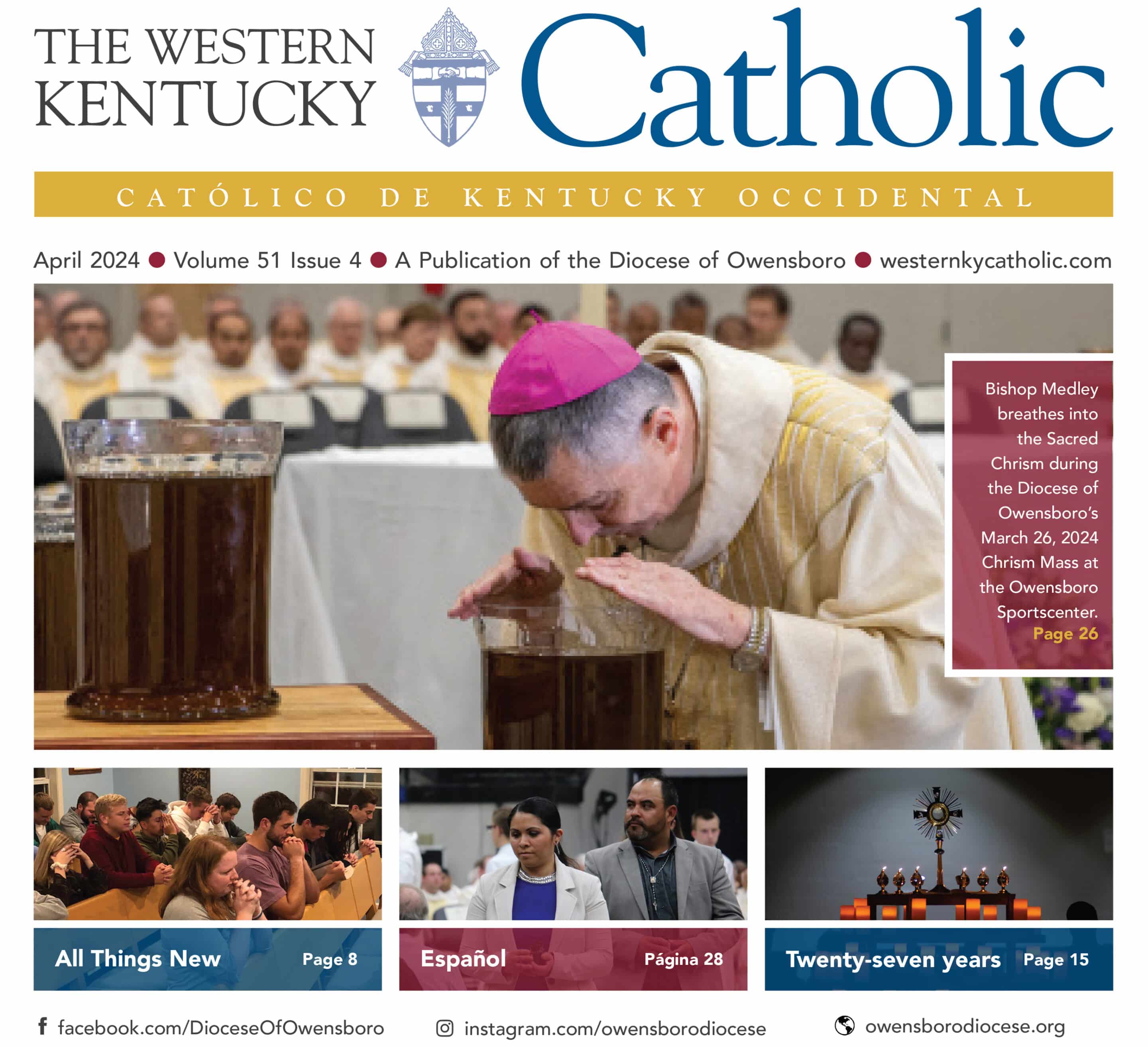
Scott Ingram, a director of case management for Catholic Charities of the Diocese of Owensboro, volunteers as the diocese’s Pastoral Assistance Coordinator, whose role is to receive reports of abuse by anyone acting in the name of the Church. FILE PHOTO
In showing he cares, Pastoral Assistance Coordinator is showing ‘that the Church cares’ for abuse survivors
BY ELIZABETH WONG BARNSTEAD, THE WESTERN KENTUCKY CATHOLIC
It can “make a big difference” when someone acknowledges another person’s “hurt and the pain,” says the Diocese of Owensboro’s new English-speaking Pastoral Assistance Coordinator, whose role is to receive reports of abuse by anyone acting in the name of the Church – whether it occurred recently or long ago.
“Knowing the Church is there for them and cares; that this will not be swept under the rug” is crucial, according to Scott Ingram, who officially became the Pastoral Assistance Coordinator, or PAC, on May 23.
“If I show them that I care, I am showing them that the Church cares,” said Ingram, who with his wife, Michelle, attends St. Stephen Cathedral in Owensboro.
Ingram, 54, accepted the role following Louanne Payne’s retirement from the ministry after four years. Miguel Quintanilla serves as the diocese’s Spanish-speaking PAC.
The Pastoral Assistance Coordinator, also known as the Victim Assistance Coordinator, is a volunteer position. According to the Charter for the Protection of Children and Young People, every diocese and archdiocese of the United States should have someone in this role.
The “Charter,” as it is often called in Church circles, was established 20 years ago this month by the U.S. Conference of Catholic Bishops, following the revelation that sexual abuse of minors by clergy had been covered up by the U.S. Church for decades.
The Charter includes guidelines for reconciliation, healing, accountability and the prevention of future abuse, and was updated most recently in 2018.
Ingram said he is no stranger to the sad reality of abuse within institutions.
After retiring in 2016 from his position as a detective with the Daviess County Sheriff’s Department, Ingram was assigned to the State of Kentucky’s Cabinet of Health and Family Services to perform specialized investigations.
These investigations, said Ingram, were of any facility – including schools, daycares and hospitals – “that had any kind of complaints of any type of physical and sexual abuse of anyone at any age.”
He saw and heard a lot during those years, but this has helped him become all more compassionate and caring when encountering someone who was victimized.
Today, Ingram’s day job is serving as a director of case management with Catholic Charities of the Diocese of Owensboro. But per the requirements of the PAC role, he has the PAC cell phone with him at all times in case someone calls to report an allegation.
Ingram said a PAC “needs to be empathetic and a good listener, and hear what (the caller is) saying with no judgments. Something is hurting them. They have to know you’re there to listen, to help, and support them.”
Believing the person is the first step, he said, but even more important is showing the victim-survivor you believe them.
This applies to PACs as well as to anyone who hears another’s story of abuse.
If the victim-survivor has a perception that “he doesn’t believe me or doesn’t care,” Ingram said this could send the person down a path “with some terrible results.”
That “first contact can make a difference,” he said. “It’s a path where there’s no room for error: you’ve got to assure them that everyone cares and that you want to help.”
A caller to the PAC number “should expect to speak to someone who wants to hear their story, the hurt and the pain and what happened,” said Ingram. “I am going to help them and walk through the process with them of finding therapy and whatever outlets are needed to heal and get into a good place.”
Ingram said he has personally benefited from talking to a therapist and said he encourages others to do the same.
He said that in the early days of his career in law enforcement, “it was not good to say you needed help. People believed they didn’t need therapy” but that this often led to “some problems later down the road.”
Fortunately, “it’s become more normal to be able to say ‘I’m talking to someone and need help,’” said Ingram. “Therapy is number one.”
He said he is pleased to see conversations about mental health awareness in today’s society are increasing, and hopes this continues.
Ingram’s community involvement includes having served as a board member of New Beginnings Sexual Assault Support Services; he has served with Alliance for Drug Free Owensboro and Daviess County; he is currently a member of the Knights of Columbus; and he is the founder and teacher of Streetwise Self Defense for Women and Teens.
To report suspected abuse, call the Kentucky Child Protection Hot Line: 1-877-KYSAFE1 or 1-877-597- 2331 (Toll Free) or contact your local Commonwealth Attorney. To report abuse to the diocese, current or past, by anyone acting in the name of the Church, call Scott Ingram, Pastoral Assistance Coordinator (English) at 270-852-8380 or Miguel Quintanilla, Pastoral Assistance Coordinators (Spanish) at 270-880-8360. You may also visit the Office of Safe Environment (owensborodiocese.org/safe) for more information. To make a report of sexual abuse of a minor and related misconduct by bishops, go to ReportBishopAbuse.org or call 1-800-276-1562.

